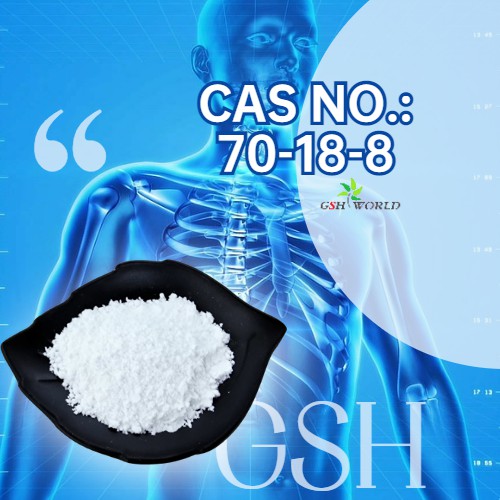For those who are concerned about beauty ingredients, glutathione must be no stranger, and it is one of the most widely used beauty ingredients.
Whether it is skin care products, or whitening needles, whitening pills, health food, ordinary food, you can see its figure.
In the business promotion, GSH can remove free radicals, antioxidant, anti-aging, whitening, freckle, almost omnipotent, then, these propaganda in the end is not credible?
First, we need to understand what glutathione is.
What is glutathione?
Glutathione is a tripeptide formed from glycine, cysteine and glutamic acid.

Glutathione is widely found in plants, animals and microorganisms, and is one of the most important non-protein sulfhydryl compounds in living organisms.
There are mainly two kinds of reduced glutathione (GSH) and oxidized glutathione (GSSG).
Reduced glutathione (GSH), which is abundant and plays a major role in living organisms, is involved in the REDOX reaction in cells and is a coenzyme of some enzymes.
What does glutathione do?
1, Antioxidant effect
Glutathione is ubiquitous in the human body, is a natural reducing agent in the human body, easy to be oxidized into GSSG, so as to protect other substances from oxidation, is the main “killer” of free radicals in the human body, protect the sulfhydryl group in the protein is not oxidized, repair the destroyed sulfhydryl group in the protein, so that the protein can restore the active function.
In addition, when ultraviolet light shines on the skin, it will also produce a large number of free radicals, which will activate the production of melanin.
GSH can destroy these free radicals, inhibit the activity of tyrosinase, regulate the conversion mechanism from eumelanin to fusomelanin production, prevent melanin production from the front end, and play a role in whitening.
2, Detoxification
Glutathione has a certain detoxification effect on the poisoning caused by carcinogens such as CO, heavy metals, organic solvents and epoxides, and can be combined with it and discharged from the body.
It has a protective effect on leukopenia caused by radiation, radiation drugs or anti-tumor drugs.
GSH can bind to various carcinogens and play a detoxification role through liver metabolism, such as aflatoxin.
3, Prevention and treatment
Glutathione can protect the liver, promote liver detoxification, often used in the treatment of alcoholism, cirrhosis, hepatitis, fatty liver and other diseases, long-term use of GSH can inhibit the formation of alcoholic fatty liver.
Glutathione is also beneficial for the maintenance of corneal and lens transparency and tissue repair and regeneration, and can also used to treat cataracts, corneal diseases and retinal diseases.
4, Anti-aging
GSH can effectively remove free radicals, delay cell aging, accelerate cell regeneration, and thus delay the aging process of the whole person.

Glutathione widely used in food, medicine, cosmetics and other fields because of its good antioxidant and immunomodulatory effects.
In the pharmaceutical industry, GSH drugs that have achieved clinical application include GSH injections, tablets and eye drops, etc.
Glutathione is mainly applicable to:
① Adjuvant treatment of alcohol and drug poisoning
Adjuvant treatment of liver damage caused by alcohol, viruses, drugs and other chemicals
(3) Adjuvant treatment of therapeutic injuries caused by ionizing rays
④ Auxiliary treatment of hypoxemia
(5) Auxiliary treatment of corneal ulcer, corneal epithelial exfoliation, keratitis, early Alzheimer cataract, etc.;
In the field of food, glutathione’s powerful antioxidant properties have also attracted much attention. On the one hand, glutathione can used in the processing of dairy products, meat, baby food, seasonings, etc., to play the role of antioxidant, inhibiting Browning, extending storage life, enhancing flavor and so on.
On the other hand, as a functional active factor, it used in the production of functional foods and oral health products.
Disadvantages of glutathione
At present, GSH produced by fermentation, the microorganisms used are mostly yeast and Escherichia coli,
fermentation technology mature, the product is safe, high purity, and MSG belongs to the fermentation industry products.
Although the effect of “reduced glutathione” is powerful, it has a fatal disadvantage,
that is, it is afraid of light, afraid of water, afraid of high temperature, and poor stability.
At present, GSH often combined with vitamin C, lipoic acid or cysteine in health food,
and the main effect is to provide antioxidant properties and promote the improvement of skin whitening effect.
How to supplement glutathione?
Due to the low absorption and availability of oral GSH,
there are three better ways to supplement glutathione than oral GSH:
First, eat the precursors of glutathione directly.
Like cysteine, let cysteine combine with glutamate and glycine in the body to form GSH.
Current studies have also found that supplementation with n-acetylcysteine (NAC) can effectively increase the level of GSH in the whole blood,
according to experiments, the efficiency of the improvement is probably between 10% and 30%.
Second, sublingual glutathione.
In 2015, a study conducted by French researchers suggested that a patented sublingual GSH lozenge may be the best oral form of GSH available.
By comparing sublingual ingestion, the experimental results found that sublingual ingestion may the best form of absorption among the three, and other indicators such as GSH/GSSG ratio and hemoglobin index basically confirmed this.
Third, intravenous glutathione.
The main purpose is to bypass the gastrointestinal tract and go directly into the blood,
allowing the GSH army to perform “antioxidant” and “detoxification” tasks in the body unharmed.
reference
- [1] LAPENNA D. GSH and glutathione-dependent enzymes: From biochemistry to gerontology and successful aging [J]. Ageing Research Reviews, 2023, 92: 102066.
- [2] CAI Youhua, Wu Zihao, Huang Xiaochen, et al. Research progress on characteristics, industrial production and application of reduced glutathione in health industry [J]. Food and Machinery, 2012,38(11):1-10.
- [2] CAI Youhua, Wu Zihao, Huang Xiaochen, et al. Research progress on characteristics, industrial production and application of reduced glutathione in health industry [J]. Food and Machinery, 2012,38(11):1-10.
- [4] Schmitt B, Vicenzi M, Garrel C, et al. Effects of N-acetylcysteine, oral GSH and a novel sublingual form of GSH on oxidative stress markers: A comparative crossover study[J]. Redox Biology, 2015, 6: 198-205.




